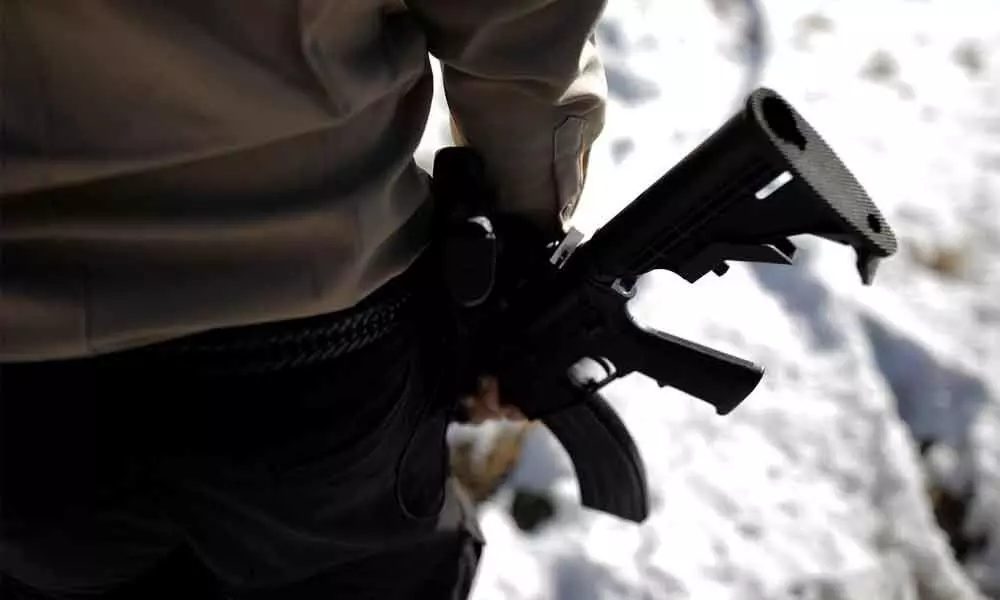Just In
Survival camps cater to new fear: America's political unrest


Aiming an AR-15 rifle across a Colorado valley dotted with antelope and cattle, Drew Miller explains how members of his new survival ranch would ride out an apocalypse.
Aiming an AR-15 rifle across a Colorado valley dotted with antelope and cattle, Drew Miller explains how members of his new survival ranch would ride out an apocalypse.
The former US Air Force intelligence officer said his latest Fortitude Ranch community, under construction below mountain forests, will shelter Americans fleeing anything from a bioengineered pandemic to an attack on the electricity grid.
For an annual fee of around $1,000, members can vacation at the camps in good times, and use them as a refuge during a societal collapse.
"If you've got a lot of weapons, if you've got a lot of members at guard posts, defensive walls, we don't think we're going to need to fight," said Miller, crouching on top of a fortified position on the camp perimeter.
The expansion of Miller's camp chain underscores the growing mainstream appeal of the "prepper" movement long associated with anti-government survivalists.
In recent years prepping has overlapped with millennial interests in renewable energy, homesteading, minimalist living and concerns about climate change.
Then there is politics.
Increasingly, Miller said, clients fear sharp political divisions will deepen around the Nov. 3, 2020 U.S. presidential election.
"There is growing concern that after the 2020 election there could be massive, long-lasting civil unrest if people say, 'Hey, I don't buy the new president, I don't recognize him or her,'" said Miller, who has added "civil war" to his risk scenarios.
Skeptics said Fortitude Ranch was preparing for catastrophic events that were unlikely and possibly not worth surviving.
There is a rational level of readiness for natural disasters or power outages, said New York University Professor Robyn Gershon, and then there is "hyper-extreme" preparedness.
She predicted a bad ending for anyone holing up in a compound with strangers to make it through a global pandemic or nuclear war.
"The quality of life will be degraded to a point where, for modern-day people, it probably won't be worth living," said Gershon, a clinical professor of epidemiology.
The solar-powered camps cater to middle-class Americans worried about their vulnerability in cities and suburbs. Unlike traditional survivalists, many are not schooled in off-the-grid living, and some have no idea how to hunt.
Besides the annual fee, the main requirement for members is an AR-15 style rifle or pump-action shotgun for defence.
The camps stock about three months of food and have goats and chickens. In a collapse situation, members would follow orders from camp leaders like Miller. Tasks would include collecting firewood and nuts, killing game and growing vegetables. Everyone would do guard duty.
Miller expects marauding gangs to pour out of cities if law and order breaks down. He expects his ranches to have superior firepower. The new Colorado camp has a .50 calibre rifle to take on armoured vehicles.
Anthropology professor Chad Huddleston said such fears sounded like "apocalyptic fiction."
"The research around the world shows that communities come together first, before anything else," said Huddleston of Southern Illinois University, Edwardsville, citing studies on the aftermath of disasters like Hurricane Katrina.
Fortitude Ranch has around 175 members from all ethnic groups, many with business or military backgrounds, and most distrust the government, said Miller. He asked that exact locations of camps not be disclosed.
If he can find investors, Miller hopes to expand communities from two existing locations in Colorado and one in West Virginia to 10 more states.
Members like health insurance professional Kiki Bandilla, 53, of Castle Rock, Colorado, worry about over-dependence on modern technology and see the ranches as survival insurance.
"We all need to have a certain level of preparedness," said Bandilla, who runs Denver's Self Reliance Expo showcasing everything from tiny homes to body armour. "I see it becoming a little bit more mainstream, because I believe what's happening in our government, on both the right and the left, is chaos."
Tom, a 52-year-old who runs a Maryland housing business, fears a 2021 economic meltdown and wants a place to take his girlfriend and children.
"You're going to have a lot of people who are going to want to give up, but most of those people are not going to be at the ranch," he said, asking that his last name not be used.
Just how many Americans are prepping is hard to measure as most keep their activities secret.
People within the industry, including Roman Zrazhevskiy, chief executive of Ready To Go Survival, said interest is growing.
Zrazhevskiy said sales of his survival-kit bags and gas masks have doubled or tripled on demand from "liberal preppers". "They're concerned about what Trump is doing," he said. "The whole civil war thing isn't that implausible."
Some within the movement say private survival communities may not be for everyone.
"It would be a challenge, I think, to throw a hundred people into a compound without really knowing each other," said Don Rodgers, who runs Rocky Mountain Readiness, which trains families in emergency preparedness and sells gear.
"It would take a special group and a special leader to hold that together."
Miller believes Fortitude Ranch is that group: "If you've got to be here, then it means it's really, really bad out there, so where are you going to go?"

© 2024 Hyderabad Media House Limited/The Hans India. All rights reserved. Powered by hocalwire.com






